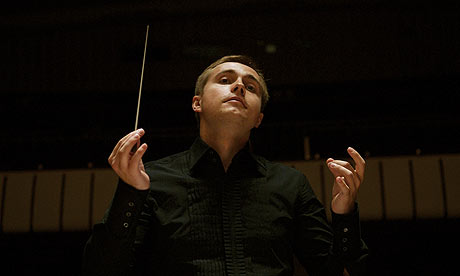
Do orchestras and arts organisations suffer more than others at a time of financial insecurity, when people are watching their wallets? It would be an exaggeration to say that British orchestras are weathering the economic storm better than most. However there are clear examples of audience numbers holding firm and box office targets being met – and in some cases exceeded. My own orchestra, the Royal Liverpool Philharmonic, saw ticket sales increase by 25% last season. We no doubt benefited from the increase in visitors to Liverpool thanks to its status as European capital of culture 2008, but looking forward to this current season, ticket sales are still positive.
The public values and supports the arts, even – perhaps especially – when times are tough. Living in Russia during the collapse of the USSR and seeing years of extreme poverty, I noticed that classical music was very helpful for citizens and helped ease daily life. In comparison, today, when Russia is relatively better off, it seems to me that the interest in and intensity of cultural life is much lower.
Music is a universal language and has the ability to unite people. The results of an Association of British Orchestras (ABO) poll released this week reveal a similar trend. There is a real appetite for classical music, with people saying they would rather spend money on going to concerts or the theatre than buying tickets for sporting events or buying new computer games. Even when money is tight, more than half believe the arts and orchestras should be supported.
We are more worried as a sector about the levels of support we can expect from corporate and public-sector donors. There may be a feeling that in a recession supporting the arts is a luxury. But the polling results show how wrong this would be. At the Liverpool Phil we've recently received the welcome news that Liverpool city council has maintained 2008 funding levels for the next two years; let's hope others follow that lead.
This week, the orchestral community has come together at the ABO annual conference, under a theme of "Sustainability - the orchestra's future in a changing climate". It will offer a reminder that no one is safe and provides an opportunity to look more closely at what orchestras are doing to rise to the challenge.
Orchestras must adapt and be innovative if they are to broaden their reach and remain sustainable. Whether it's new marketing techniques bringing classical music into the new digital age or adapting concert halls in order to help sustain the audience, all play an important part in sharpening what orchestras have to offer.
And part of bringing in new audiences involves extending our reach and looking to the future generation of music-lovers, including those who may not see themselves as concert-goers. Every week orchestras all over the country are working with schools and communities to give children and new audiences the chance to experience classical music for themselves.
At the Liverpool Phil, we recently won one of three national pilots for the Government's In Harmony project – based on the pioneering El Sistema initiative in Venezuela – which will see thousands of children from some of the country's most deprived areas take part in orchestral projects.
Music has the power to transform lives, whether that's hearing it in the concert hall or in schools, community groups or further afield. British people know they have superb orchestras that make them proud. It's now up to us to continue to reach out to new audiences and keep innovating.

